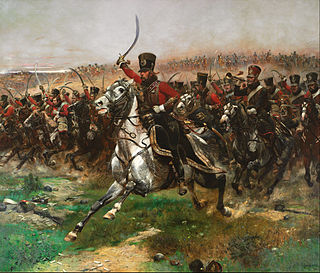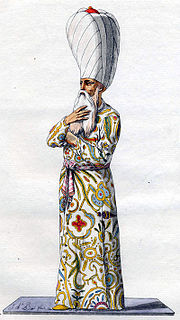Mamluk is a social institution in the Islamic world before the nineteenth century.
Contents
Mamluk, Mameluke, or Mamaluke may refer to:
Mamluk is a social institution in the Islamic world before the nineteenth century.
Mamluk, Mameluke, or Mamaluke may refer to:

Historically, cavalry are soldiers or warriors who fight mounted on horseback. Cavalry were the most mobile of the combat arms, operating as light cavalry in the roles of reconnaissance, screening, and skirmishing in many armies, or as heavy cavalry for decisive shock attacks in other armies. An individual soldier in the cavalry is known by a number of designations depending on era and tactics, such as cavalryman, horseman, trooper, cataphract, knight, hussar, uhlan, mamluk, cuirassier, lancer, dragoon, or horse archer. The designation of cavalry was not usually given to any military forces that used other animals for mounts, such as camels or elephants. Infantry who moved on horseback, but dismounted to fight on foot, were known in the early 17th to the early 18th century as dragoons, a class of mounted infantry which in most armies later evolved into standard cavalry while retaining their historic designation.

The 13th century was the century which lasted from January 1, 1201 (MCCI) through December 31, 1300 (MCCC) in accordance with the Julian calendar.
Norman or Normans may refer to:
Matilda or Mathilda may refer to:
The eagle is a large bird of prey.

Mamluk is a term most commonly referring to non-Arab, ethnically diverse slave-soldiers and freed slaves who were assigned military and administrative duties, serving the ruling Arab dynasties in the Muslim world.

The Imperial Guard was originally a small group of elite soldiers of the French Army under the direct command of Napoleon I, but grew considerably over time. It acted as his bodyguard and tactical reserve, and he was careful of its use in battle. The Guard was divided into the staff, infantry, cavalry, and artillery regiments, as well as battalions of sappers and marines. The guard itself as a whole distinguished between the experienced veterans and less experienced members by being separated into three sections: the Old Guard, Middle Guard and Young Guard.

An imperial guard or palace guard is a special group of troops of an empire, typically closely associated directly with the Emperor or Empress. Usually these troops embody a more elite status than other imperial forces, including the regular armed forces, and maintain special rights, privileges and traditions.

A kilij or a pusat is a type of one-handed, single-edged and moderately curved scimitar used by the Seljuk Empire, Timurid Empire, Mamluk Empire, Ottoman Empire, and other Turkic khanates of Eurasian steppes and Turkestan. These blades developed from earlier Turko-Mongol sabers that were in use in lands controlled or influenced by the Turkic peoples.

Sultan of Egypt was the status held by the rulers of Egypt after the establishment of the Ayyubid dynasty of Saladin in 1174 until the Ottoman conquest of Egypt in 1517. Though the extent of the Egyptian Sultanate ebbed and flowed, it generally included Sham and Hejaz, with the consequence that the Ayyubid and later Mamluk sultans were also regarded as the Sultans of Syria. From 1914, the title was once again used by the heads of the Muhammad Ali dynasty of Egypt and Sudan, later being replaced by the title of King of Egypt and Sudan in 1922.
Intercontinental is an adjective to describe something which relates to more than one continent.
Warning may refer to:

Charles John Spencer is a retired American professional wrestler. He is best known for his appearances with World Championship Wrestling under the ring name Tony Marinara and with Extreme Championship Wrestling and World Wrestling Entertainment under the ring name Tony Mamaluke.

A Mameluke sword is a cross-hilted, curved, scimitar-like sword historically derived from sabres used by Mamluk warriors of Mamluk Egypt after whom the sword is named. Egypt was, at least nominally, part of the Ottoman Empire and the sword most commonly used in Egypt was the same as used elsewhere in the empire, the kilij.
A dynasty is a series of rulers from one family.
A gentleman is a man of good quality.

Roustam Raza, also known as Roustan or Rustam, was a mamluk bodyguard and secondary valet of Napoleon.
Abū al-Baqa Hamza Al-Qa'im, was the thirteenth Abbasid caliph of Cairo for the Mamluk Sultanate between 1451 and 1455. He was deposed by Sultan Sayf ad-Din Inal after al-Qa'im supported a mutiny of mamluks against Inal.
Cravat, cravate or cravats may refer to:

The Mamelukes of the Imperial Guard were a cavalry unit that served in Napoleon I’s Imperial Guard during the Napoleonic Wars. Originally made up of Mameluk slave soldiers, the unit eventually was mostly recruited from a wide mixture of Middle Eastern and European soldiers. Originally only mustering a single squadron, a second squadron would be raised from European cavalrymen in 1813, both squadrons served under the Regiment of Chasseurs a Cheval of the Imperial Guard. The various spellings of the squadron's title include Mamelukes, Mamluks and Mamelouks.